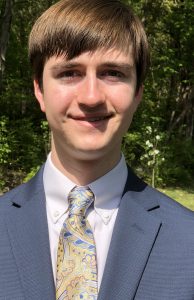The U.S. Department of Defense has awarded two University of Alabama mechanical engineering students a scholarship that covers their full tuition and secures them a job after graduation.

Two graduate students, Olivia Miller and George Stubblefield, were both awarded the Science, Mathematics and Research for Transformation, or SMART, Scholarship for Service. The program, through the DOD, funds undergraduate and graduate students pursuing a science, technology, engineering, math, or STEM, degree with an interest in working for the government after graduation.
“I was ecstatic when I found out that my application even made it through the first round of consideration. After looking at previous winners, I realized that the competition for these scholarships was extremely high,” Miller said. “The fact that I am able to work at a place that I love while also conducting research at UA is a huge blessing.”
The prestigious scholarship includes full tuition and education related fees, health insurance, summer research internships, mentoring and guaranteed employment at a DOD facility after graduation.
“It’s nice to know where my funding will come from for the rest of grad school, where I’ll work in the summers, and where I’ll work post-graduation,” Stubblefield said.
Miller and Stubblefield were encouraged to apply by Dr. Paul Allison, assistant professor of mechanical engineering at UA, who is working with the students on their graduate school research.
“Both of these students are extremely intelligent with an amazing work ethic, which just exemplifies the type of high quality engineering graduate students we have at The University of Alabama,” Allison said. “I know both of these students will make valuable contributions to the nation and the warfighter as they progress in their careers, and I am immensely proud they were selected for the DOD SMART Scholarship program.”

Miller is working at the U.S. Army Space and Missile Defense Command in Huntsville, Alabama. She said the USASMDC has a need for alloys that protect against corrosion because many of its projects are located in corrosive environments, which falls in line with her research. Also, Miller said saving as much weight as possible for space missions is another important goal of the command.
“My research involves recycling titanium scraps through additive manufacturing, as well as making parts that have ideal material and mechanical properties,” Miller said. “The titanium alloy I will be researching is known for both its high strength-to-weight ratio and resistance to corrosion. So, having experience with that alloy will be beneficial.”
She will receive funding for a year and a half, which is the projected time necessary to finish her master’s degree.
Stubblefield is working with the U.S. Army Engineer Research and Development Center Geotechnical and Structures Laboratory in Vicksburg, Mississippi. He will receive funding for three years.
“I believe my work in graduate school will give me research experience in my field that I can then take to work after graduation,” Stubblefield said.
